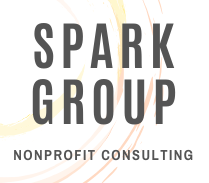Improve Your Grant Writing Success Rates: Part 1
Did you know that Spark Group offers grant writing services? Organizations seek out a grant writing consultant for several reasons. Maybe they don’t have the organizational bandwidth to write grants. Perhaps they feel overwhelmed by the process. Maybe they want to steward their costs and only pay for grant writing when they need it. Spark Group consultants have grant experience and knowledge of grant writing best practices. If you would like to set up an initial appointment to discuss grant writing services, you can click here.
However, if you would like tips on how to improve your grant writing statistics, then this post is for you. Over the next two weeks, we will look at two ways to improve your stats: Research & Connections
Research
The first step in the grant writing process is research. Applying for the right grant is just as important as any other aspect in the cycle. For example, foundations have stringent requirements about whom they will fund, what type of funding they provide, and the geographic focus of their philanthropy. If you disregard those specifics, you will not have success. There is no point in writing a grant for funds to support a food pantry in Idaho to a Foundation that only supports Animal Shelters in Kansas.
If you open up Google and type in “nonprofit grants” you are going to become overwhelmed quickly. Accessing the right foundation database makes the process easier and more effective.
Grant Databases
Grant databases like Foundation Directory or Grant Station make searching for appropriate grants easy. With these databases, you can search for foundations that match your specific needs and see a list of several possibilities. You can also find specifics on how to apply and upcoming deadlines.
If your organization can’t afford the subscription fees, there are still ways that you can access these research tools. Check the database websites to find local libraries that hold a subscription, check your local academic institution, or make friends with another nonprofit and see if they will let you do some research in return for a trade. Lastly, check your local nonprofit association. For instance, members of the Michigan Nonprofit Association receive free access to Grant Station. There are many reasons for your organization to join its local nonprofit association and resources like Grant Station make the membership fee pay for itself.
If you want to improve your grant statistics, you need to start at the beginning. If you pay attention to the research portion of your grant cycle, you will save time and money.
Stay tuned for next week’s Monday post to hear about how using your connections can increase your grant success too.
⭐ Join our weekly newsletter where we share tons of exclusive tips, tools, grant opportunities, and resources to our subscribers. Subscribe on the Spark Group home page.





